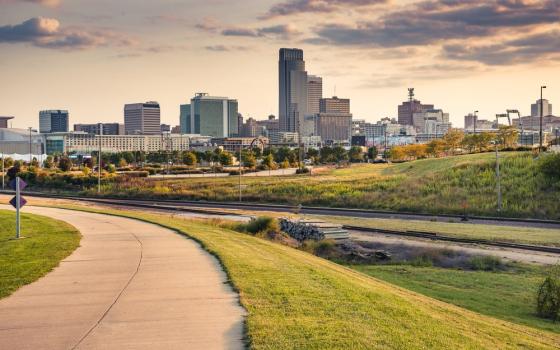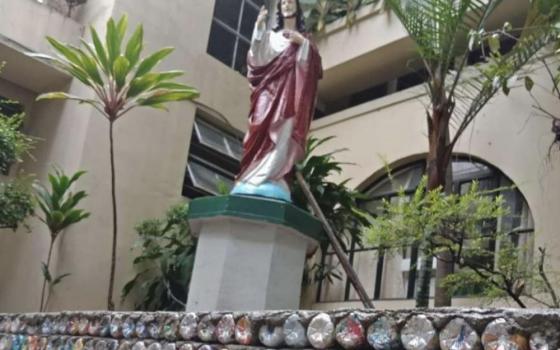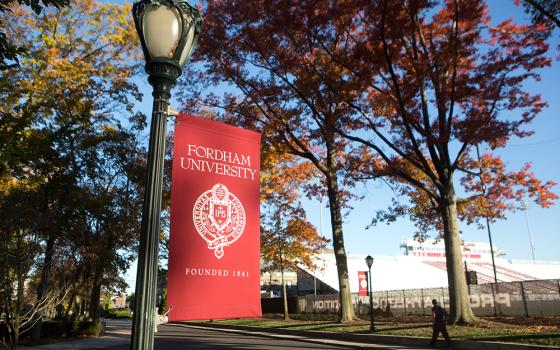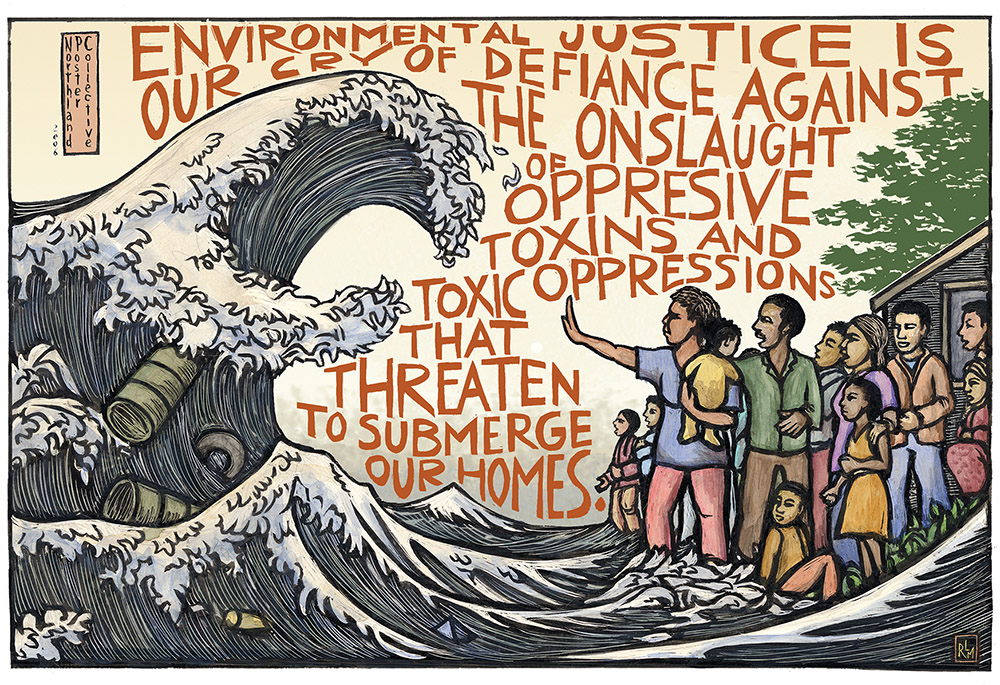
In this poster, people stand up against a tidal wave of environmental destruction. The costs of this tidal wave are borne most heavily by the poor, Indigenous people and people of color. Air, water and people all need protection. This illustration is a spinoff of the famous print "Under the Wave off Kanagawa," also known as "The Great Wave," by Japanese artist Katsushika Hokusai. (Ricardo Levins Morales)
Editor's note: EarthBeat is publishing a series of essays on the goals of the Laudato Si' Action Platform from speakers at the 2023 "Laudato Si' and the U.S. Catholic Church" conference, held virtually throughout June and July and co-sponsored by Creighton University and Catholic Climate Covenant. This essay is on the Laudato Si' Goal "Response to the cry of the poor."
In 1991, while working as chief economist for the World Bank, Lawrence Summers authorized an internal memorandum for distribution at the bank. The memo advocated for the "migration of the dirty industries" to the world's least developed countries. "[T]he economic logic behind dumping a load of toxic waste in the lowest wage country is impeccable," the memo asserted, "and we should face up to that." It went on to single out sparsely populated countries in Africa as "underpolluted," and lamented the difficulty in efficiently transferring environmental costs to the African continent. Such transfers would be "world welfare enhancing," the memo asserted.
It is unlikely, of course, that the welfare of the "underpolluted" regions of Africa would be enhanced. The ecosystems in these regions, and all the myriad forms of life that participate in these ecosystems, would be subjected to toxins and hazardous wastes. Moreover, whatever short-term economic gain some political and corporate interests might glean from accepting the migration of dirty industries, would be outweighed by the fact that the introduction of such industries would disincentivize other, more healthful, forms of economic development and societal formation. The Summers memo, in effect, proposed turning these otherwise unspecified regions of Africa into what Steve Lerner labels "sacrifice zones."
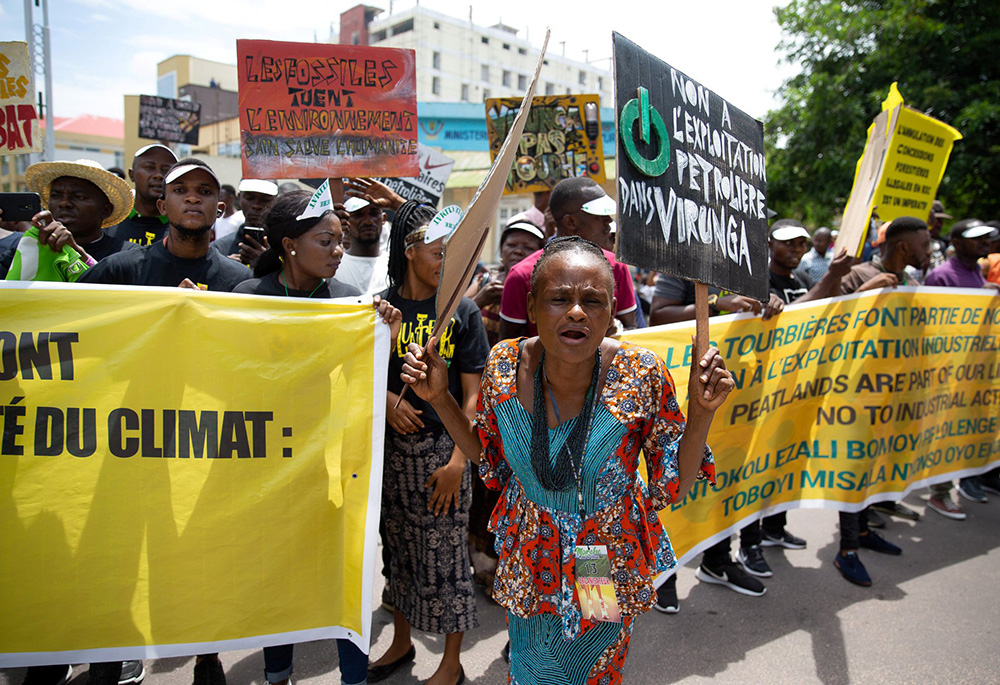
A woman leads environmental activists as they participate in a climate protest Nov. 29, 2019, in the streets of Kinshasa, Congo. Catholics in Africa celebrate the Congo Basin as the second lung of the earth and call for its protection to fight climate change. (CNS/Reuters/Hereward Holland)
In appalling fashion, then, the views of the Summers memo capture the fact that questions of politics, economy and society can never be separated from those of ecology and the environment. Rather the social and the environmental always inform one another intrinsically and inextricably. The recognition of this interrelatedness is foundational to the views of Pope Francis' 2015 encyclical "Laudato Si', on Care for Our Common Home." "Today," the pope exhorts, "we have to realize that a true ecological approach always becomes a social approach; it must integrate questions of justice in debates on the environment, so as to hear both the cry of the earth and the cry of the poor." As Francis makes clear, love of neighbor and love of earth cannot be separated.
The pope's insight into the closeness of the relationship between love of neighbor and earth is, in fact, consonant with the biblical witness. In the second creation narrative of Genesis, God forms the first human out of the fertile soils of the garden. Later, God forms the animals of the earth out of the same soil. God breathes God's life-giving breath into each of these creatures. In this same narrative, God calls the human person "to cultivate and care" — which can also be translated as "to serve and preserve" — for the life of the garden (Genesis 2:15). Here, though never stated explicitly, the message is plain: Love and care for neighbor and earth are rooted in the same soil and ought to be attended to accordingly.
Of course, the realization that the cries of the Earth and poor interpenetrate one another has always been evident to those with ears to hear and eyes to see. Indeed, the views of the Summers memo reflect a perennial injustice present within human history. As Andrew Jorgenson, a sociologist at Boston College, observes, "Throughout human history, more powerful societies and nation-states have utilized their geopolitical-economic power to create and maintain ecologically unequal exchanges with less powerful and less developed societies and countries." Continuing in his description of this phenomena, Jorgenson finds that, in the contemporary world, the Global South functions as both a "tap" and a "sink" for the Global North. It acts as a tap in that, throughout the South, the life-giving resources of the earth are appropriated, extracted and accumulated by state and corporate actors affiliated with the Global North. These same state and corporate actors simultaneously externalize the costs of pollution and ecological degradation to the "sink" of the Global South. The Summers memo, therefore, simply sought to encourage and optimize an enduring reality.
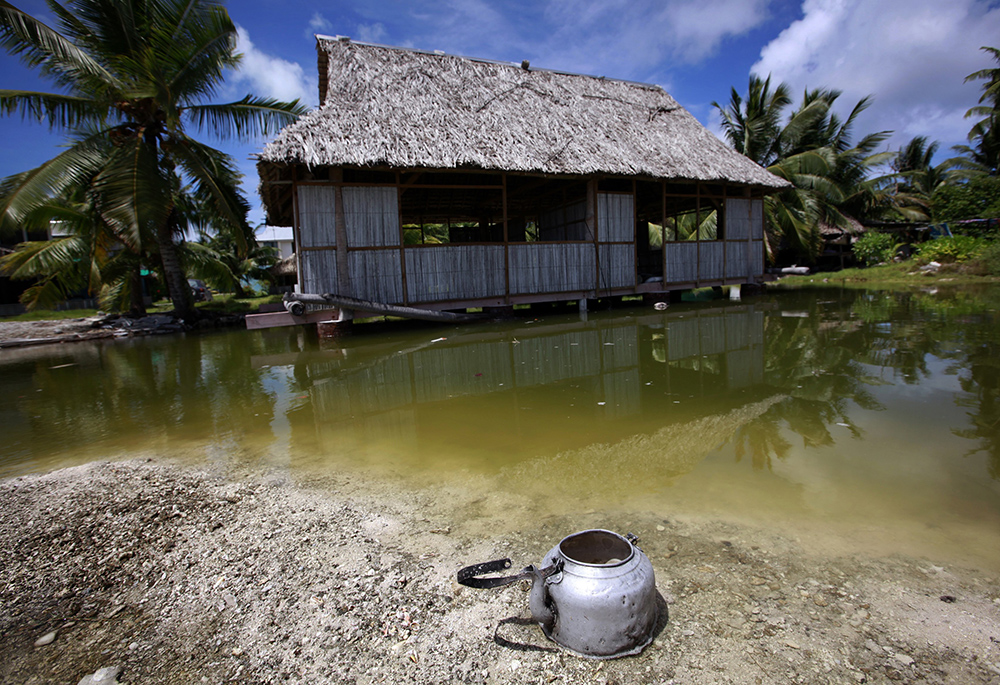
An abandoned house that is affected by seawater during high tides stands next to a small lagoon near the village of Tangintebu on South Tarawa in the central Pacific island nation of Kiribati, May 25, 2013. Pope Francis has said island nations need protection from extreme environmental and climate changes. (CNS/Reuters/David Gray)
Indeed, the phenomena that Jorgenson describes helpfully illuminates Francis' claim in Laudato Si' that, "A true 'ecological debt' exists … connected to commercial imbalances with effects on the environment, and the disproportionate use of natural resources by certain countries over long periods of time." This debt, in fact, has been accruing throughout centuries of extractive colonial and neocolonial oppression and abuse as Western powers have sought to reduce the soil, and all that comes from the soil, within colonized spaces into the commodities of land and labor.
The dynamics of politico-ecological exploitation and indebtedness are present not only on a global scale, but on regional and local scales as well. In the early 2000s, when teaching high school in East St. Louis, Illinois, I was constantly struck by how my students bore within their bodies the cost of environmental racism. The vast majority of the teenagers that I taught — all of whom were Black — suffered from chronic illnesses, while their homes and city were surrounded by the polluting factories of Monsanto and Pfizer. Across the Mississippi River in St. Louis, Monsanto was and remains a steadfast corporate sponsor of the beautiful Missouri Botanical Gardens, a predominantly white space, where St. Louisans would gather for wine and music on the lawn in the summer. The botanical gardens are indeed lovely and events such as music on the lawn, in many respects, can be understood as welfare enhancing. Again, however, one must ask: Whose welfare is being enhanced?
Advertisement
In light of the dynamics of exploitation and indebtedness, it is clear that healthful responses to the cries of the Earth and the oppressed cannot be accommodated by a "business as usual" approach to politics, economics and society. Rather, the earth and the oppressed cry out for the peoples of this world to work for a political ecology of repair rooted in metanoia — a turning away from the dominant logics, patterns and structures organizing the world today. This is why Pope Francis makes an urgent call for "ecological conversion." To bear witness to the reign of God that Jesus proclaimed, a reign in which the meek inherit the earth, new wineskins are needed.
Yet, paradoxically, the life-giving reality of God's reign is already present amongst us. To give but two examples, it is present in movements such as the Black Church Food Security Network, which seeks to cultivate vegetable gardens on church lands and also connect Black churches with Black farmers as they confront the realities of food apartheid. It is also present in the work of the most recent iteration of the Poor People's Campaign, which seeks comprehensive national policy reform to promote social and ecological health.
The invitation of Laudato Si', then, is not only to identify the closeness of the relationship between the cries of the Earth and poor, but also to discern how persons and communities of faith can and are giving of their lives in response to the cries, so that we might join in this work and, in so doing, reflect God's love for the world.





